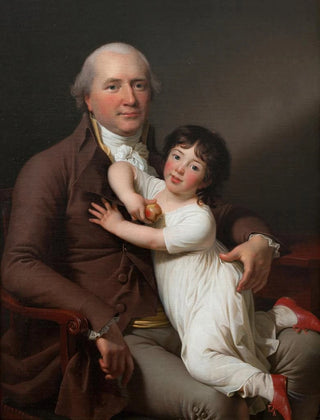Art print | Peter Tutein with his youngest son Louis Alexander - Jens Juel


View from behind

Frame (optional)
In the fascinating world of art, some works stand out for their ability to capture intimate and moving moments. "Peter Tutein with his youngest son Louis Alexander" by Jens Juel is one of those creations that transcend a simple portrait to become a true window into the human soul. This artwork, created in the 19th century, evokes not only the tenderness of a father towards his son but also a time when family values and personal relationships were emphasized. Through this painting, Juel invites the viewer to immerse themselves in a world where the simplicity of everyday gestures becomes a source of deep reflection on life and parenthood.
Style and uniqueness of the work
Jens Juel's style is characterized by a realistic approach and meticulous attention to detail. In this piece, the delicate features of Peter Tutein and his son are rendered with precision that demonstrates the artist's exceptional talent. The expressions of the characters, imbued with softness and complicity, are highlighted by subtle lighting that enhances the depth of the faces. Juel succeeds in creating a warm, almost tangible atmosphere, where one can almost feel the tenderness that unites the father and his child. The colors, carefully chosen, bring visual harmony that reinforces the emotion conveyed by the scene. This art print does not merely depict a frozen image; it tells a story, that of an unbreakable bond between two beings.
The artist and his influence
Jens Juel, born in 1786 in Copenhagen, is recognized as one of the great masters of Danish portrait art. His career spanned several decades, during which he captured the essence of his contemporaries with rare sensitivity. Influenced by the artistic currents of his time, Juel managed to blend tradition and innovation, allowing him to stand out in the European artistic landscape. His work is marked by a desire to represent not only the physical appearance of his subjects but also their character and personality. By painting "Peter Tutein with his youngest son Louis Alexander," Juel does not merely create a family portrait; he immortalizes a moment

Matte finish

View from behind

Frame (optional)
In the fascinating world of art, some works stand out for their ability to capture intimate and moving moments. "Peter Tutein with his youngest son Louis Alexander" by Jens Juel is one of those creations that transcend a simple portrait to become a true window into the human soul. This artwork, created in the 19th century, evokes not only the tenderness of a father towards his son but also a time when family values and personal relationships were emphasized. Through this painting, Juel invites the viewer to immerse themselves in a world where the simplicity of everyday gestures becomes a source of deep reflection on life and parenthood.
Style and uniqueness of the work
Jens Juel's style is characterized by a realistic approach and meticulous attention to detail. In this piece, the delicate features of Peter Tutein and his son are rendered with precision that demonstrates the artist's exceptional talent. The expressions of the characters, imbued with softness and complicity, are highlighted by subtle lighting that enhances the depth of the faces. Juel succeeds in creating a warm, almost tangible atmosphere, where one can almost feel the tenderness that unites the father and his child. The colors, carefully chosen, bring visual harmony that reinforces the emotion conveyed by the scene. This art print does not merely depict a frozen image; it tells a story, that of an unbreakable bond between two beings.
The artist and his influence
Jens Juel, born in 1786 in Copenhagen, is recognized as one of the great masters of Danish portrait art. His career spanned several decades, during which he captured the essence of his contemporaries with rare sensitivity. Influenced by the artistic currents of his time, Juel managed to blend tradition and innovation, allowing him to stand out in the European artistic landscape. His work is marked by a desire to represent not only the physical appearance of his subjects but also their character and personality. By painting "Peter Tutein with his youngest son Louis Alexander," Juel does not merely create a family portrait; he immortalizes a moment






